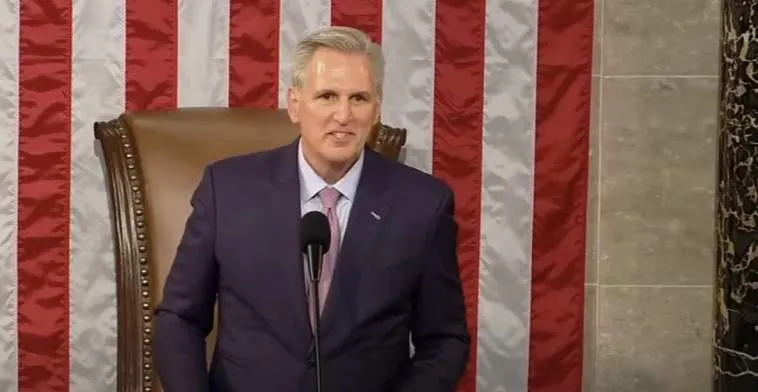(Washington Examiner) Members of Congress are heading back to Capitol Hill this month, with House Republicans on track to pass a stopgap funding extension to avoid a government shutdown.
House Speaker Kevin McCarthy (R-CA) has indicated he expects to pass a short-term continuing resolutionto give Congress more time to pass and negotiate bills to avoid a shutdown. In the meantime, House Republicans are racing to set forward their own demands to eliminate “reckless spending” and secure crucial policy wins.
The House has already struggled to pass its 12 appropriations bills, only passing one on the floor before leaving for August recess. When the House returns on Sept. 12, members will have only 12 working days to pass the remaining appropriations bills.
McCarthy can afford to lose no more than four Republican votes if he hopes to pass all 12 before funding expires on Sept. 30. As such, House GOP members are making demands in four key areas in order to secure their support for a continuing resolution.
Lower spending
House Republicans are splintering over spending cuts because members of the House Freedom Caucus are looking to cut spending to the fiscal 2022 level of $1.47 trillion, which is $200 billion less than what President Joe Biden and McCarthy agreed to in the debt ceiling compromise.
Analysts say a hard-line spending cut would mean cuts of up to 25% in areas such as agriculture, infrastructure, science, commerce, water, energy, and healthcare, according to Reuters.
House Freedom Caucus members also oppose a “blank check” for Ukraine in any appropriations bill. The Biden administration received severe backlash from conservatives earlier this month after requesting $40 billion in emergency supplemental funding, which included $24 billion in aid to Ukraine.
Rep. Chip Roy (R-TX) is one of several hard-line conservatives who have said they will oppose a resolution that keeps the same spending levels until a new budget is passed. Rep. Marjorie Taylor Greene (R-GA) said she will oppose any measure that sends more money to Ukraine.
At the same time, centrist Republicans, who are mostly content with the budget limits in the debt ceiling bill, are imploring their hard-line GOP peers to consider budget priorities that will be accepted by the Democratic-controlled Senate and the White House.
However, some Republicans are not worried about a government shutdown at all.
“I’m pretty open about the fact that we shouldn’t fear a government shutdown,” Rep. Bob Good (R-VA) previously said. “And if that’s what’s necessary to force spending cuts, then we should utilize that.”
Border security
House Freedom Caucus members also said they would oppose any spending measure that does not include the Secure the Border Act, the House GOP’s border security bill.
The bill aims to build more of the wall at the southern border and restrict asylum for those seeking to remain in the U.S. for fear of persecution or harm, according to PBS.
Roy has threatened to withhold his support of any appropriations bill if Congress does not vote to tighten security at the southern border, which he calls a “national crisis.” He also demanded the ousting of Homeland Security Secretary Alejandro Mayorkas, whether he “is removed from office, resigns, or is fired.”
Fourteen Texas Republicans joined Roy’s letter to colleagues, alerting that they would oppose any Department of Homeland Security funding bill that does not take “necessary steps to secure the border.”
“I will not vote for a [continuing resolution],” Roy said before the House left for recess last month. “I will not help advance a [continuing resolution] in any way, shape, or form.”
“Woke” Pentagon policies
House Freedom Caucus members have pledged to oppose a resolution that does not “end the left’s cancerous woke policies in the Pentagon.” However, the statement does not specify how they want to see “woke policies” at the Pentagon ended.
Some GOP members offered similar sentiments in controversial amendments to the National Defense Authorization Act, some of which passed the House but did not pass the Senate. Several amendments sought to eliminate diversity, equity, and inclusion policies and departments within the Department of Defense.
Others focused on changes to the Pentagon’s COVID-19 policies, as well as addressing prohibiting funding for abortions and gender reassignment surgeries.
The Democratic-controlled Senate passed its own version of the NDAA, sending the House back to the drawing board and setting up a showdown this fall






